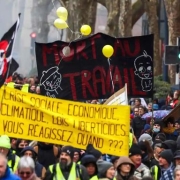United Kingdom and other European countries tossed by giant waves of workers’ strikes
Many European countries have seen a surging wave of strikes and protests since 2022. Leading the labor charge are the workers’ unions in the United Kingdom, France, and Spain. Other European countries, including Germany, Italy, Hungary and Portugal, also launched strikes in the beginning of 2023.
The Europe-wide strike wave is being generated by intense economic crisis (fuelled by galloping inflation especially in energy and food prices) and social unrest. The millions of strikers and protesters feel underpaid, overworked, neglected, and clobbered with anti-strike sanctions and police action while negotiations have ground to a halt.
So far, there is wide public support for the labor strikes and union demands, even in the case of key public services such as health, schools and transport. Teachers’ strikes have been supported by students.
IN THE UNITED KINGDOM
At the forefront of the Europe-wide strike wave are the industrial and service workers of the United Kingdom. The strikers include transport workers, teachers, health personnel, civil servants, and other labor sectors.
In the most recent peak of labor action on 1 February, some half a million UK workers went out on strike and street protests (75 rallies nationwide). This is the UK’s largest single day of nationally coordinated strikes, in effect almost a general strike, since the general strike of 30 Nov 2011. It is also reminiscent of the historic general strikes of 1979.
For the first time in the history of the country’s National Health Service (NHS), health workers and nurses are joining the strikes. The mainstream Trades Union Congress (TUC, representing 48 unions) joined the 1 Feb nationwide action. So far, there is wide public support for the labor strikes and their demands for higher wages, even in the case of key public services.
What unites a broad range of workers and professionals in this massive strike is the common demand for higher pay and union rights. The Rishi Sunak government has so far been refusing to fund public sector pay rises. Worse, it is pushing for legislation that would undermine the right to strike by requiring “basic service levels” to be maintained in the fire, ambulance and rail sectors in the event of walkouts.
The government (which controls public-sector pay levels directly and private-sector pay levels indirectly) has been offering measly raises of 4% or 5%, while other pay raise offers are as low as 2-3%. This is in the face of a 10.5% annual inflation rate, which translates to higher energy costs and food prices that are ravaging ordinary households especially during winter months.
Ironically, the government uses this same economic crisis as its alibi, claiming that even small pay hikes would result in worse inflation and budget deficits at a time of high interest rates.
Transport
In the transport sector, the strikes are being called by the Associated Society of Locomotive Engineers and Firemen (ASLEF, with 12,500 members) and the National Union of Rail, Maritime and Transport Workers (RMT), which covers the wider transport sector including Network Rail and 14 train firms.
The ASLEF and RMT unions remain in gridlock with rail firms over pay raises. They also demand “job benefits and decent schedules” in response to “crazy shifts and long driving times” (as a bus driver said). Rail firms are proposing that certain train checks are scrapped as cost-cutting measure, which the unions object to because of safety concerns.
Earlier, rail strikes in December 2022 severely disrupted the yearend holidays, followed by five days of rail and bus stoppages in early January. The 30 Jan strike reduced train service to only 30%. ASLEF- and RMT-led strikes have been slated for Feb 1, 4 and 11.
Civil servants and firefighters
Some 100,000 civil servants who belong to the Public and Commercial Services union (PCS) joined the 1 Feb. nationwide strike to push their demand for a 10% pay hike.
The PCS strike covered 124 government departments. Previous PCS walkouts in 2022 involved Border Force staff, National Highways workers, and driving examiners.
The PCS is also holding another strike vote for 30,000 other union members working in other public agencies, with the result expected by end-February. Other PCS-organized government staff workers are likewise set to strike for six days on 20-25 February.
The Fire Brigades Union (FBU) rejected a pay offer of 5% and is set to announce strike dates on 9 February, covering its membership in England, Scotland and Wales.
The union’s general secretary explained that the measly pay offer is too small, considering that “firefighters and control room staff … have already lost at least 12% of the value of their pay since 2010,” and that the strike is “an absolute last resort for our members.”
Health and related sectors
On 21 Dec. 2022, then again on 23-24 and 30 Jan., some 18,000 ambulance workers (members of the GMB, UNISON and UNITE unions) went on strike over a measly 4% pay hike and severe NHS working conditions. Paramedics and other workers belonging to UNISON joined the strike on 23 Jan.
For February, the three unions announced (or are voting to decide on) further walkouts in a total of 18 ambulance trusts in England, Wales and Northern Ireland on nine pre-scheduled dates throughout the month, and again on 6 and 20 Mar.
UNISON and UNITE are two of UK’s largest unions, with public-sector and private-sector members working in public services. UNISON has 1.3 million members while UNITE has 1.24 million. GMB is likewise one of the UK’s biggest general (multi-line) unions, with over 600,000 members.
Nurses from the Royal College of Nursing (RCN) are gearing up for a two-day strike on 6-7 Feb. across England (at 73 NHS trusts) and Wales. They staged their first strikes on 15 and 20 Dec. (at 44 NHS trusts), followed by strikes on 18-19 Jan. (at more than 60 NHS trusts and the Blood and Transplant service). RCN Scotland, also poised to strike this February, are holding back for further talks with Scotland’s government.
Nurses are severely overworked and underpaid, and say that they’re “literally at breaking point.” Said a London nurse: “The decision to strike has been horrendous, because the last thing we want to do is leave our patients. But patients aren’t receiving the care they need at the minute because there’s not enough of us, and there will never be enough of us unless there’s fair pay. All we want to do is provide the care we are experts at.”
Meanwhile, some 40,000 junior doctors belonging to the British Medical Association (BMA) are to decide on 20 Feb. if they will go on a three-day strike in March over pay issues. The Hospital Consultants and Specialist Association union (HCSA, with 3,500 members) has already voted to go on strike over pay issues.
The strike fever is likewise spreading through the ranks of midwives, maternity support workers, and physiotherapists, as well as among institutional staff at the National Institute for Health and Care Excellence (NICE) and the Care Quality Commission.
Education sector
University academic staff and teachers joined other UK workers in the 1 Feb. nationwide strike over issues about pay, conditions and anti-strike laws.
The strike involved some 300,000 teachers in the National Education Union (NEU, the largest union in the sector) and 70,000 members of University and College Union (UCU). It affected around 23,400 schools (about 85%) in England and Wales, and 150 universities. Many schools were fully or partially closed.
The UCU will hold 18 days of strike action in February and March (including further stoppages on 7 and 9 Feb.), while the NEU will hold seven days of strike action through February and March alongside members of the Educational Institution of Scotland (EIS).
Previous strikes last year (24-25 and 30 Nov.) affected 150 universities, followed by another strike on 1-3 Dec. affecting 58 universities. On 20 Jan., some 200 teaching staff at a Sheffield college walked out. This was followed on 24 Jan. by the strike of some 200 UNITE-affiliated non-academic staff at Imperial College London. The striking cleaners, maintenance and security staff, and technicians previously stopped work in November over the same pay issue.
Teachers and support (academic and non-academic) staff suffer from declining pay in real terms, pension cuts, crushing workloads (with teachers working uo to 50 or even 70 hours per week), overloaded classrooms, and big gaps in gender, race and disability pay.
The government is threatening the union members with huge pay deductions for just a few days of strike action. It is even blaming the strikers for “damaging children’s education” and is conflating their legitimate action with the truly disruptive Covid lockdown policies adopted since 2020.
Yet parents and students remain broadly supportive of the teachers’ strikes.
IN FRANCE
On 7 Feb., a third wave of nationwide strikes and street march-rallies took place across France
to protest the Macron government’s plans to raise the minimum retirement age to 64 from the current 62, and pension cuts that could “save” an estimated 13 billion euros per year and “stave off” state bankruptcy.
Led by an alliance of major labor unions, political parties, and activist groups, some 760,000 people took part in over 200 street mass actions. The strikes severely disrupted rail and urban transport, and cancelled 20% of flights at Paris Orly airport. Teachers and students also joined the strike, closing down schools and blocking off university buildings.
As of 8 Feb., have continued a campaign of strikes and related protests across France, still to oppose the proposed pension reforms. From 7 to 8 Feb., the transport workers’ strike at the French National Railway Company (SNCF) and the Parisien Public Transport Operator (RATP) have significantly impaired national, regional, and Paris-area train services.
Various sectors of the country had been expressing massive resistance to the pension reforms. On 19 Jan., in the first wave of nationwide protests against the unpopular pension reforms, nearly 2 million people joined march-rallies and one-day strikes (including national and local transport stoppages) on the issue.
A week later, on 26 Jan, workers in energy firms and fuel refineries walked out as part of the two-day strike called by the General Confederation of Labour (CGT), while dock workers launched a 24-hour strike. On 31 Jan., in the second wave of nationwide protests, 3 million workers, professionals and students marched and stopped work nationwide.
The government has declared the pension cuts as “non-negotiable” in the face of looming budget deficits, despite the immense public opposition. It has also ordered tens of thousands of riot police to attack the street protestors, and threatened them against more militant protest actions that might “block the country and the daily life of the French.”
The alliance will hold a fourth wave of nationwide protests on 11 Feb., which is expected to involve big march-rallies in Paris, Lyon, Marseille, Nantes, Nice and Strasbourg.
At the same time, the Macron clique faces widening opposition and heated desk-banging debates in parliament over the issue. “The younger generations hate you,” a female worker-lawmaker belonging to the radical-left La France Insoumise told the government ministers. She accused them of never having held a physically demanding job and not needing “to wake every morning with an aching back”.
IN SPAIN
Air traffic controllers. On 6 Feb., air traffic controllers at 16 airports began their second weekly schedule of one-day strikes. Thir first wave of strikes were held on 30 Jan. They are set to keep striking every Monday until at least 27 Feb., to push their demand that Spain’s government increase the consumer price index and remove a 12-15% cut in salaries.
The striking workers in the 16 airports are all employed by private firms. They say they are the “worst-paid” air traffic controllers in all Europe, and are the only ones who have to pay for their own training.
Air transport workers’ wages are being eaten up by inflation, and they are being forced to work longer hours and in worse working conditions. Collective bargaining talks broke down in January, but the unions say they could continue their staggered every-Monday strikes until Easter or even beyond.
Doctors, nurses and health workers. Primary care doctors, pediatricians and other doctors in Madrid have continued a widespread strike. They are pushing for lower staffing ratios (a maximum of 35 patients per day for family doctors and 25 for pediatricians), and an unconditional pay rise of 479 euros.
Their unions began an indefinite strike on 22 Nov. 2022, suspended it during the Christmas holidays, then resumed it later until now. In Catalonia, thousands of doctors walked out on 24-25 Jan. to protest excessive workloads and insecure contracts. In Barcelona, hundreds of nurses joined march-rallies on 24 Jan. over understaffing, low pay and insecurity.
Spain’s healthcare unions are also pursuing their own strike-and-protest campaign for increased government funding in health services and to protest changes in the out-of-hospital emergency care system. They joined the doctors by launching their own strikes on 23 and 25 Jan. Thy have also planned march-rallies in Madrid on 12 Feb. and more strikes in the coming weeks, including the forthcoming strike in the Navarre region slated for 15 Feb.
Teachers. Teachers joined the 24-25 Jan strike. Their demands were for additional staffing and to reverse previous cuts to the education budget. In a militant form of protest, they occupied the Barcelona Education Consortium building and called for the Minister for Education to resign.
According to the unions, some 20% of teachers joined the walkouts. In support of the strike, students also walked out in a number of secondary schools.There were no school closures because the Catalan government imposed high minimum service requirements on the teachers’ strike.
Major strike waves in January 2023 also hugged headlines in other countries of Europe, such as Portugal, The Netherlands, Belgium, Scandanavian countries, Germany, Hungary, Croatia, Greece, Cyprus, and Turkey.




Leave a Reply
Want to join the discussion?Feel free to contribute!